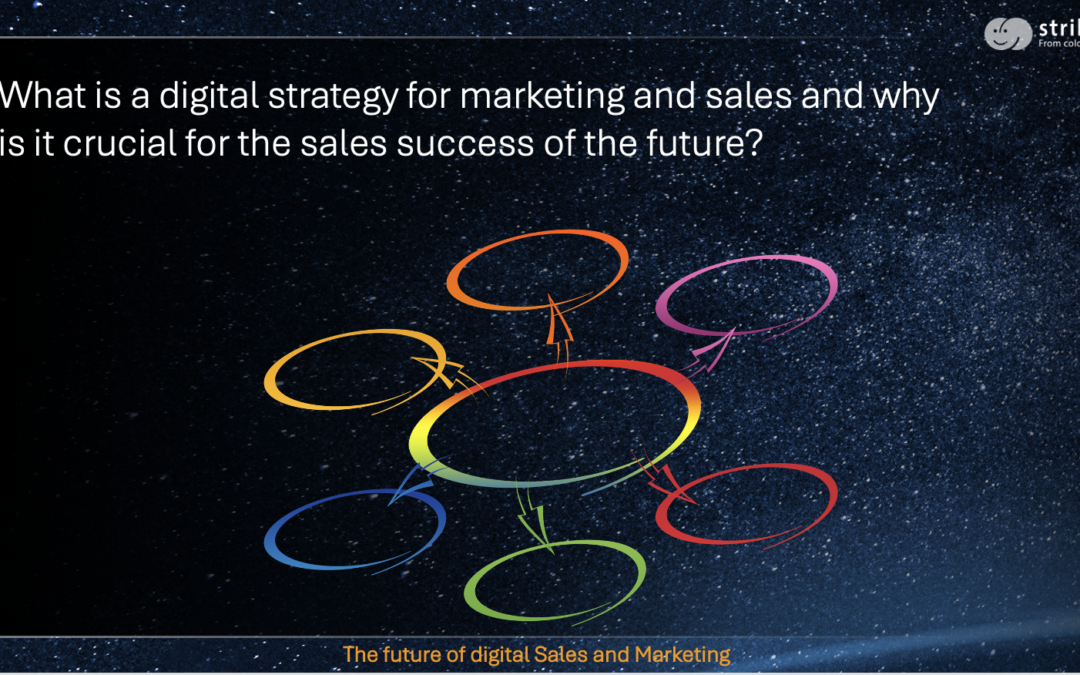Introduction
Digitalisation has fundamentally changed the way companies interact with customers. Especially in the B2B sector and for complex offers that require explanation, it is essential to develop a well thought-out digital strategy for marketing and sales. But what exactly is behind this and why is it so important today?
Find out in this article:
- What a digital strategy is for marketing and sales
- What advantages it offers
- Which core components make up a successful strategy
- How to use digitalisation specifically for your company
1 What is a digital strategy for marketing and sales?
A digital strategy for marketing and sales describes the targeted use of digital channels, technologies and data to acquire customers, retain them in the long term and increase sales. However, it also includes the combination with the classic possibilities of marketing and sales. It is an integral part of the corporate strategy and ensures that digital measures are not isolated but coordinated with each other.
1.1 The role of digitalisation in the B2B sector
Buying behaviour has changed drastically, especially in the B2B sector with complex products and services:
- Information is obtained digitally: customers research online before making sales contact.
- Personalised experiences are in demand: companies expect targeted, relevant content and no longer generic advertising messages.
- Longer decision-making and purchasing processes: Sales must use digital tools to target and guide potential customers.
- More complex decision-making bodies: In the complex B2B sector, the decision is usually not made by a persona, but by a purchasing committee / buying centre. Digitalisation supports the integration of the entire buying centre throughout the entire customer journey.
Without a clear digital strategy, companies run the risk of losing valuable leads and falling behind the competition.
2 Why is a digital strategy crucial for marketing and sales?
2.1 Competitive advantages through digital processes
A well thought-out digital strategy helps companies to differentiate themselves in the market. Those who use digital technologies strategically can work more efficiently, better fulfil customer expectations and ultimately increase sales.
2.2 Increasing efficiency and automation
- Marketing automation optimises lead generation and existing customer management with automated nurturing processes.
- CRM systems help to manage customer relationships in a structured way.
- Data-driven analyses provide valuable insights for optimising marketing and sales strategies.
2.3 Increased visibility and customer loyalty
A digital strategy ensures that companies are visible on the right channels and address their target group in a targeted manner. Content marketing, social selling, search engine optimisation (SEO), AI and marketing/sales automation platforms play a central role in this.
the core components of a successful digital strategy
3.1 Clear objectives and target group analysis
Before digital measures are defined, clear goals should be set, e.g:
- Generate more qualified leads
- Increase customer loyalty
- Make sales processes more efficient
- Increase existing customer sales
- Prevent customer loss
A detailed buyer persona analysis based on the Schuster Model®) helps to understand the target group precisely and to address it in a targeted manner.
3.2 Content marketing as a success factor
Relevant content is at the heart of every digital strategy. Whitepapers, blog articles, webinars and case studies are particularly crucial in the B2B sector in order to build trust and support decision-making processes.
3.3 Search engine optimisation (SEO) and SEA
A targeted SEO and SEA strategy is required for potential customers to find companies online:
- On-page optimisation: optimisation of content, meta tags, loading times, etc.
- Off-page optimisation: building backlinks to improve domain authority
- Google Ads & LinkedIn Ads: Targeted campaigns for more reach
3.4 Marketing automation and CRM integration
Automation solutions help to efficiently qualify leads and transfer them to sales. A well-networked CRM system enables seamless customer communication and improves conversion rates. CDPs (Customer Data Platforms) help you to control processes across all systems and increase sales success.
3.5 Social selling and digital sales channels
LinkedIn and other platforms are not only important for employer branding, but also for direct sales. Social selling strategies enable sales teams to target potential customers and build trust. Detailed behavioural analyses provide valuable insights into the accessibility, behaviour and optimal approach of desired customers.
3.6 Data-driven decision-making
Data analysis and AI-supported tools make it possible to continuously optimise campaigns and sales strategies. KPIs such as conversion rates, customer lifetime value (CLV) and return on investment (ROI) are crucial for success.
4 Conclusion: Setting the course for the digital future now
A digital strategy for marketing and sales is not a luxury, but a key success factor. It helps companies to assert themselves in the digital market environment, reach customers more efficiently and secure long-term growth.
Those who act now and develop a clear digital strategy will make the most of the opportunities offered by digitalisation. Are you ready for the digital future?


